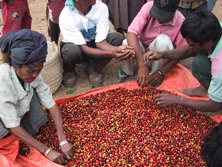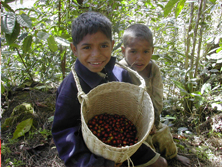In 2002, PARCIC launched a project to support the farmers in Timor-Leste towards economic self-reliance through the fair-trade of the important export product: coffee. We work together with coffee farmers to create a cooperative organization. Timor-Leste has 13 prefectures, of which 6 prefectures cultivate coffee. PARCIC decided to work in Maubisse in Ainaro Prefecture.
Maubisse is located at 1,200-1,500 meters high in the mountains. With the ample rainfall and the difference of the temperature between the day time and night time, Maubissi is advantaged for producing good quality of coffee. Coffee cultivation in Timor-Leste began during the Portuguese colonial period and it spread to Maubisse area only recently around 1960s. Most of the farmers are small-scale with averaging one hectare of farmland. Approximately 25,000 people in 4,000 households live in Maubisse and most of them grow coffee.
In this area, Maubisse coffee producers’ cooperative (Cooperativa Agrikultura Moris Foun Unidade Kafe Nain Maubisse: COCAMAU) has been organized.
As of 2014, COCAMAU has 439 member households. In 2002, we started to work with only 34 households there. It took so much time for farmers to truly understand what ‘cooperative’ means after long-lasting colonial rule. Misconception on cooperative was widely spread under the rule of Indonesia. We went through a decade of trial and error. In 2003, we set the COCAMAU cooperative constitution. And we revised it when Timor-Leste’s Decree-Law on Cooperatives entered into force in 2004. The constitution stipulates the purpose of COCAMAU, decision-making process, obligations of cooperative members, and distribution of sales proceeds.
 Sorting hand-picked coffee cherries carefully
Sorting hand-picked coffee cherries carefully
 Family working together at harvest time
Family working together at harvest time